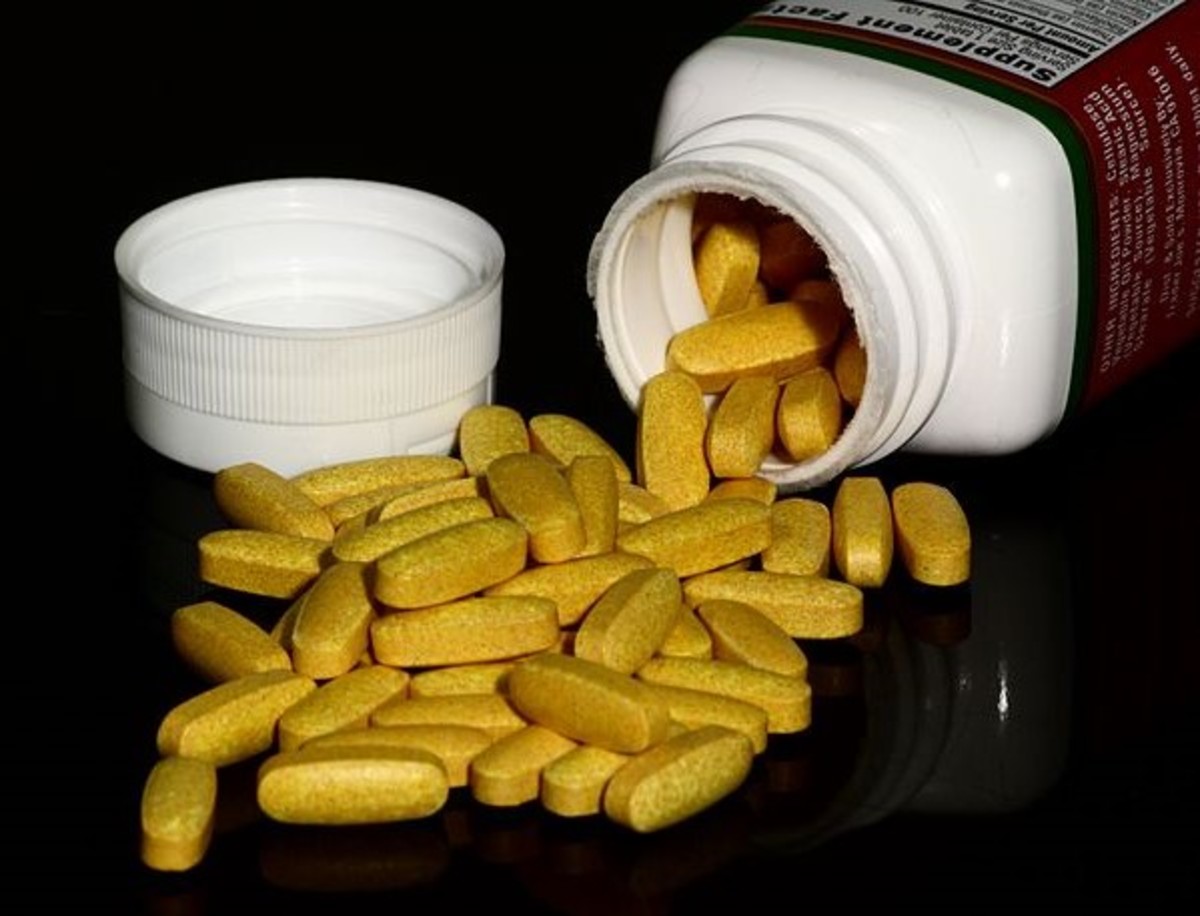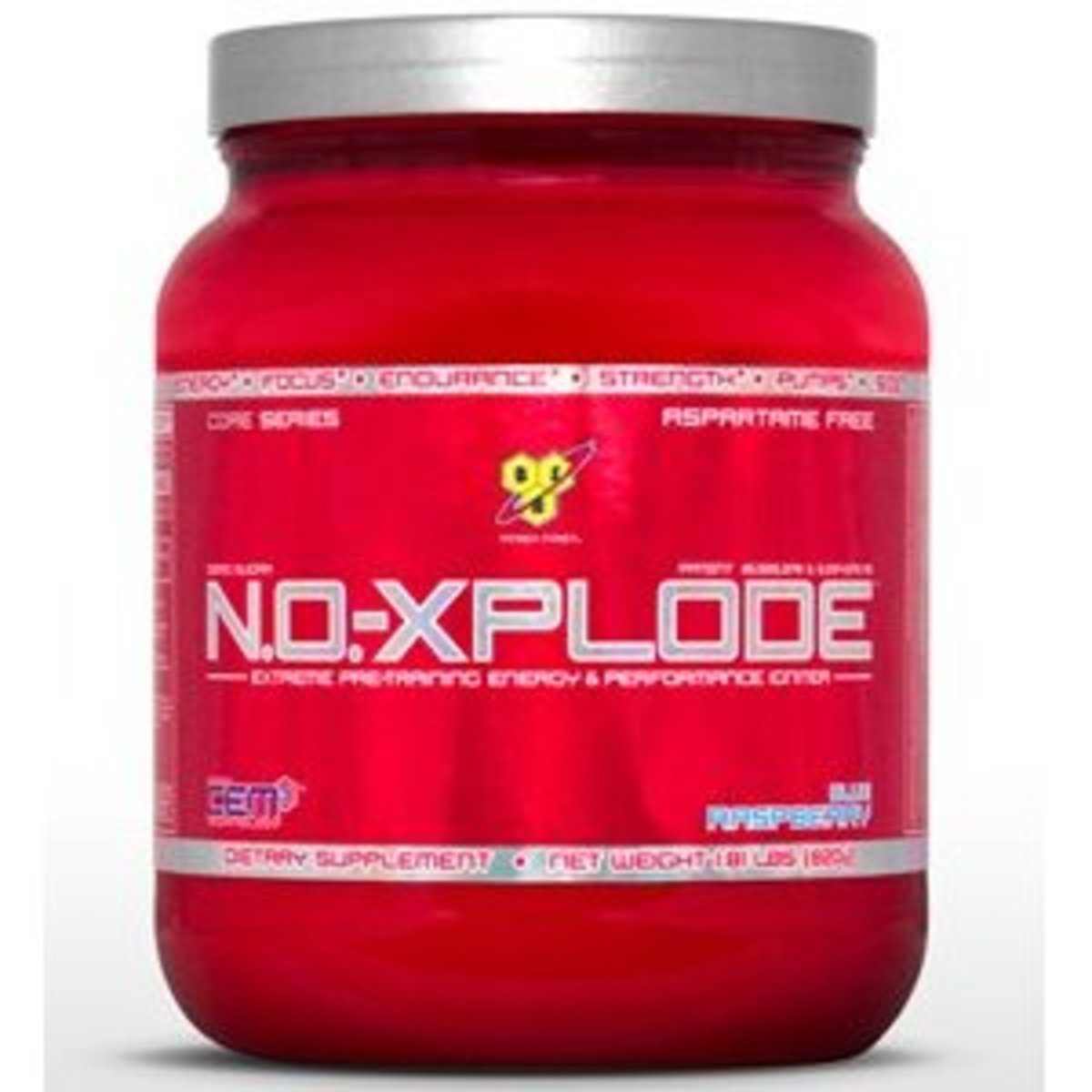The ABC's of Vitamins and Minerals
Over the years, through thick and thin, I took vitamin and mineral supplements as part of my daily life. I really didn't know what each vitamin and mineral did, but I did know that they were important to a daily healthy life. As I have learned over the years and keep on learning from day to day, I now understand the importance of vitamins and minerals and am happy to pass on the following to you so you can understand a little more as well. Good reading and best wishes for continued good health....
Vitamins are life. (Vita is actually Latin for life and amine is the class of chemical substances to which vitamins have been assigned. Though many people today think that vitamins come in a brown bottle, they are actually in all the food that you eat. When food is vitamin-deficient the consumer shows clinical symptoms of disease which are only corrected when those deficiencies are restored.
Vitamins aren't a source of energy in themselves, nor do they contribute significantly to the substance of the body. They act principally as regulators of metabolic processes and play a role in how our bodies turn proteins, fats and carbohydrates into energy. They are indispensable for the maintenance of health and are effective even in minute quantities.
In general, vitamins can't be formed in the body. They must be obtained from animal and plant sources. Exception to this are the formation of vitamin A from its precursor carotene; the formation of vitamin D by the action of ultraviolet light on the skin; and the formation of vitamin K by symbiotic bacteria of the intestines.
Improper food production plays a key role in depriving our bodies of important vitamins and minerals. Over the years, the agricultural practice of using inorganic fertilizer, over-farming, acid rain, pesticide use, and pollution have depleted the quantity and quality of vitamins and minerals in food crops. The agricultural practice of picking fruits and vegetables before they are ripe and treating them with sulfites and other chemicals to give the appearance of ripeness further robs our food sources of nutritional value.
Then there is food processing. Canning, slicing, freezing and thawing, freeze-drying, separating, extracting and a host of other procedures further deplete our foods of vitamins, minerals, enzymes, and other co-factors. Grain refining for breads, cereals, pasta, and crackers is a nutrient-killer as well.
Day by day, nutritional value is lost simply in transporting the food to the supermarket and to our kitchens. And after we take it home, we reduce it even more by baking, boiling, microwaving, and reheating it. It has been estimated that 80 to 95 percent of vitamins and minerals originally found in food are lost before we finally eat!
Added to all of this are vitamin inhibitors, substances or conditions that can reduce the body's ability to absorb a vitamin or even neutralize a vitamin within the body. Inhibitors range from negative emotions to medications such as oral contraceptives, antibiotics, cholesterol-reducing drugs or even antacids. Infections, the body's inability to digest fat, celiac disease, an overactive thyroid gland, and deterioration of the digestive system greatly increase our need for vitamin supplementation.
Vitamin Do's - The prime time to take a dietary supplement is after a meal where natural nutrients are readily available for best absorption by the body. Keep in mind that water-soluble vitamins can be excreted in our urine after four hours. Fat or soil-soluble vitamins such as A, D, E, and K remain in the body for approximately 24 hours, though excess amounts can be stored in the liver for much longer. If you must take your vitamins all at once, the rule of thumb is to take them after your largest meal of the day.
Vitamin/Mineral supplements should be stored in a cool, dark place away from direct sunlight, in a well-closed, preferably opaque container. Refrigeration is not usually required unless you live in a desert climate. By placing a few kernels of rice in the bottom of a bottle of supplements, you can effectively guard against excessive moisture. To ensure freshness, use brands that have an expiration date on the bottle. Once a bottle is opened, the shelf life is about 12 months.
When taking vitamin and mineral supplements, keep in mind how important helpers are. These can be other vitamins, minerals, fats, proteins, water, and carbohydrates that assist a vitamin to function. These helpers work synergistically with a particular vitamin or mineral. If you take a vitamin without its helpers, the body can't use it. The following will help you make sure that you're making the most of vitamins, their co-factors and minerals.
- Vitamin A (Fat soluble) - needed for normal vision in dim light; maintains normal structure and function of mucous membranes; aids in growth of bones, teeth and skin. Inhibitors - mineral oil, alcohol, coffee, cortisone, strenuous physical activities during digestion, iron sulfate, anticoagulants, laxatives, steroids, PCBs, food preservative, sodium benzoate, nitrites (antispasmodics), aflatoxin, DDT (insecticides), diarrhea, biliary dysfunction, celiac disease, and vitamin D deficiency. Helpers - B-Complex, C, D, E, calcium, phosphorus, zinc, and fat-containing food. Note: Vitamin A toxicity can be detoxified by vitamin C.
- Beta Carotene, Alpha and Gamma Carotene, Lutein, and Lycopene (Fat soluble) - a vitamin A precursor - converts to vitamin A in the liver as the body needs it; maintains normal structure and function of mucous membranes; aids in growth of bones, teeth and skin. According to recent reports, beta carotene appears to aid in cancer prevention by neutralizing free radicals in the body. Note: If you have hypothyroidism, avoid beta carotene, because your body probably canot conver beta carotene into vitamin A.
- Vitamin B-Complex (Water soluble) - The B vitamins help to maintain the health of the nerves, skin, eyes, hair, liver, and mouth, as well as healthy muscle tone in the gastrointestinal tract and proper brain function. Inhibitors - alcohol, birth control pills, coffee, infections, sleeping pills, stress, excessive sugar, and sulfa drugs. Helpers - Vitamins C and E, calcium and phosphorus.
- Vitamin B1 (Thiamine) (Water soluble) - needed for carbohydrate metabolism; maintains healthy nervous system. Inhibitors - alcohol, chlorogenic acid in coffee, fever, raw clams, excessive sugar, stress, surgery, tobacco, cooking, liver deterioration, digestion deterioration, tannin/tannic in tea or betel nuts, B6 or B12 deficiency, baking soda, and estrogen. Helpers - B-Complex, B2, folic acid, niacin, C, E, manganese, and sulfur.
- Vitamin B2 (Riboflavin) (Water soluble) - needed for fat, protein and carbohydrate metabolism; needed for healthy skin. Inhibitors - Excessive water, antibacterial drugs, alcohol, coffee, excessive sugar, tobacco, food-processing, sleeping pills, estrogen, and sodium nitrate. Helpers - B-Complex, B6, niacin, C, and phosphorus.
- Vitamin B3a (Niacin)(Water soluble) - needed for fat, protein and carbohydrate metabolism; needed for nervous system function as well as oxygen use by the body's cells. Inhibitors - alcohol, antibiotics, coffee, corn, excessive sugar and starches, excessive water, light, alkalis, sleeping pills, estrogen, alcohol, iron sulfate, and methyl bromide. Helpers - B-Complex, B1, B2, C, and phosphorus.
- Vitamin B5 (Pantothenic Acid) (Water soluble) - needed for fat, protein and carbohydrate metabolism. Inhibitors - alcohol, coffee, heat, food-processing, canning, antibacterial drugs, sleeping pills, estrogen, iron sulfate, and methyl bromide. Helpers - B-Complex, B6, B12, biotin, folic acid, C, and sulfur.
- Vitamin B6 (Pyridoxine) (Water soluble) - needed for normal growth and protein metabolism. Inhibitors - Long storage, canning, roasting or stewing of meat, excessive water, food-processing, alcohol, estrogen, alkalis, ultraviolet light, exposure to coffee, tobacco, radiation, birth control pills, and cortisone. Helpers - B-Complex, B1, B2, B5, C, magnesium, potassium, linoleic acid, sulfur, and sodium.
- Vitamin B12 (Cobalamin) (Water soluble) - needed for new tissue growth. Inhibitors - acids, excessive water, sunight, estrogen, sleeping pills, antibiotics, cholesterol-reducing drugs, low blood sugar drugs, codeine, oral antibiotic agents, aspirin, aspirin substitutes, alcohol, coffee, laxatives, and tobacco. Helpers - B-Complex, B6, cholline, inositol, C, potassium, and sodium.
- Vitamin Bc (Folic Acid) (Water soluble) - needed for new tissue growth, red blood cells, nervous system, and skin. Inhibitors - Excessive water, antibacterial drugs, sunlight, estrogen, food-processing, heat, aspirin, antibiotics, stress, and tobacco. Helpers - B-Complex, B12, biotin, pantothenic acid, C.
- Vitamin Bh (Inositol) (Water soluble) - needed for fat metabolism. Inhibitors - Caffeine, excessive water, antibacterial drugs, estrogen, food-processing, and alcohol. Helpers - B-Complex, B12, choline, linoleic acid.
- Vitamin Bp (Choline) (Water soluble) - needed for fat and cholesterol metabolism, necessary for proper liver and kidney functioning. Inhibitors - excessive water, antibacterial drugs, estrogen, food processing, coffee, alcohol, and sleeping pills. Helpers - vitamin A, B-Complex, B12, folic acid, pantothenic acid, C, lithium, manganese, and linoleic acid. Note: Don't take during depressive period of manic-depressive illness.
- Vitamin Br (Carnitine) (Water soluble) - a substance related to the B-Vitamins and being a major source of energy for the muscles. Carnitine increases the use of fat as an energy source. Inhibitors - heat, D-carnitine and dyalisis.
- Vitamin Bw (Biotin, H) (Water soluble) - needed for cell growth, fatty acid production, utilization of B vitamins, and metabolism of carbohydrates, fat and protein. Inhibitors - raw egg whites (aka avidin), excessive water, antibiotics, estrogen, food-processing, alcohol, coffee, nitrous acid, oxygen, chloramine T (form of chlorine), and strong acid or alkali. Helpers - B-Complex, B12, folic acid, pantothenic acid, C, and sulphur.
- Para Aminobenzoic Acid (Paba B Complex) (Water soluble) - helps form folic acid, needed for protein metabolism. Inhibitors - alcohol, coffee, sulfa drugs. Helpers - B complex, folic acid, C.
- Pangamic Acid (B15) (Water soluble) - needed for metabolism of protein, fat and sugar, helps stimulate the glandular & nervous systems. Inhibitors - alcohol and coffee. Helpers - B-Complex, C and E.
- Bioflavonoids (Vitamin P) (Water soluble) - needed for the proper function and absorption of vitamin C, blood vessel wall maintenance, cold & flu prevention, minimizing of bruising, strong capillary maintenance. Inhibitors - antibiotics, aspirin, cortisone, high fever, stress, tobacco, ginseng, excessive water, cooking, heat, light, oxygen, aspirin substitutes, iron sulfate, barbiturates, adrenaline, estrogen, ammonium chloride, antacids, anticoagulants, cortisone, diuretics, and antidepressants. Helpers - all vitamin and minerals.
- Vitamin C - (Ascorbic Acid) (Water soluble) - builds collagen, maintains healthy gums, teeth and blood vessels. Inhibitors - ginseng, smoking, excessive water, cooking, heat, light, oxygen, aspirin and aspirin substitutes, iron sulfate, barbiturates, adrenaline, estrogen, ammonium chloride, antihistamines, antacids, anticoagulants, cortisone, diuretics, antibiotics, high fever, stress, and antidepressants. Helpers - all vitamins and minerals, bioflavonoids, calcium and magnesium, fresh fruit and juices.
- Vitamin D-complex (Fat soluble) - needed for calcium absorption, as well as the growth of bones and teeth. Inhibitors - mineral oil, smog, laxatives, corticosteroids, and anticonvulsants. Helpers - Vitamin A, choline, C, F, calcium, and phosphorus.
- Vitamin E (Fat soluble) - protects cells from damage, improves circulation, necessary for tissue repair, promotes normal blood clotting and healing, reduces blood pressure, aids in preventing cataracts, improves athletic performance, and relaxes leg cramps. It maintains healthy herves and muscles, promotes healthy skin and hair, and helps to prevent anemia. Inhibitors - birth control pills, chlorine, mineral oil, rancid fat and oil, iron sulfate, choline, heat, oxygen, freezing, food-processing, laxatives, estrogen, and thyroid hormones. Helpers - vitamin A, B-complex, B1, inositol, C, F, manganese, selenium, and phosphorus.
- Vitamin F (Essential Fatty Acids) (Fat soluble) - helps prevent artery hardening, promotes blood coagulation, normalizes blood pressure, and assists in glandular activity. Inhibitors - radiation, x-rays, non-essential and trans-fatty acids, laxatives, mineral oil, alcohol, diabetes, aging, cholesterol, heat, deodorized and hydrogenated oils, oxygen, iron sulfate, viral infections, cancer, decreased vitamin C, and zinc. Helpers - vitamin A, C, D, E, B-Complex, magnesium, phosphorus, selenium, and zinc.
- Vitamin K - needed for the production of prothrombin which is necessary for blood clotting. Essential for bone formation and repair. Inhibitors - high doses of vitamins A or E, x-rays, radiation, frozen foods, air pollution, sweating, food processing, antibiotics, anticoagulants, anticonvulsants, anti-inflammatories, antiseptics, barbiturates, cholesterol, fat blockers, laxatives, mineral oil, and steroids.
But as important as vitamins are, they can't function and can't be assimilated without minerals. And though the body can synthesize some vitamins, it can't manufacture a single mineral.
- Boron - needed for healthy bones and metabolism of calcium, phosphorus and magnesium. It enhances brain function and promotes alertness. Inhibitors - excessive stress. Helpers - calcium and D.
- Calcium - needed for strong bones, teeth, for muscle and nerve function, and for blood clotting. Inhibitors - lack of exercise and excessive stress. Helpers - vitamin A, C, D, F, iron, magnesium, manganese, phosphorus.
- Chloride - needed for regulation of the blood's alkaline-acid balance. Inhibitors - high salt intake and diuretics. Helpers - sodium, hydrogen, adrenal hormones, and pituitary hormones.
- Chromium - needed for carbohydrate metabolism. Inhibitors - milk, high-fat & sugar diets, excess iron, refining grains, alcohol, antacids, acid blockers, and steroids. Helpers - niacin, the amino acids glycine, cysteine, and glutamic acid.
- Cobalt - essential for red blood cells. Inhibitors - none known at present. Helpers - folic acid and B12.
- Copper - essential for the utilization of vitamin C, aids in effective iron absorption. Inhibitors - high intake of zinc, antibiotics, anti-hypertensives, antivirals, cholesterol-lowering drugs, and immunosuppressants. Helpers - cobalt, iron, zinc.
- Fluorine - reduces tooth decay, strengthens the bones. Inhibitors - calcium, aluminum, other minerals. Helpers - none known at present.
- Iodine - necessary for normal thyroid function, cell respiration, energy, general metabolism, normal growth and development, protein synthesis, nerve and bone formation, good condition of skin, hair, and teeth, normal speech and mental state, cholesterol synthesis, carb absorption, conversion of carotene to vitamin A and RNA to proteins. Inhibitors - antithyroid medications, perchlorates found in drinking water, airbags, medicines used to treat thyroid conditions, and thiocyanates used in insecticides, herbicides, antibiotics, thyroid and chemotherapy drugs. Helpers - glutathione and selenium.
- Iron - carries oxygen in blood, needed for energy metabolism. Inhibitors - coffee, excess phosphorus, tea, excessive intake of zinc, alcohol, acid blockers, antibiotics, anti-gout meds, anti-spasmodics, anti-virals, cholesterol-lowering drugs, diuretics, HRTs, iron chelators (deferoxamine), immunosuppressants, steroids, and thyroid medications. Helpers - B12, folic acid, C, calcium, cobalt, copper, phosphorus.
- Magnesium - aids in nerve and muscle function, needed for strong bones. Inhibitors -high intake of calcium / fat / phosphorus / protein / sugar, drinking soft water, excessive stress, low stomach acid and vitamin D levels, processing (destroys about 85%), acid blockers, alcohol, analgesics, antacids, anti-arrythmics, antibiotics, anti-cancers, antidepressants, anti-fungals, anti-hypertensives, antiprotozoals, anti-virals, caffeine, chelating agents, cholesterol-lowering, diuretics, HRTs, immunosuppressants, laxatives, mineral oil, steroids, stool softeners, and muscle relaxants. Helpers - calcium, phosphorus, boron, vitamins B6, C, D, acidic stomach, exercise.
- Manganese - needed for normal bone structure. Inhibitors - excessive intake of calcium and phosphorus, refined food, phytates and phosphates. Helpers - vitamin K.
- Molybdenum - aids in carbohydrate and fat metabolism, needed for iron utilization. Inhibitors - refining and processing, prolonged TPN (total parenteral nutrition) treatments, too much copper or sulfur. Helpers - none known at present.
- Phosphorus - necessary for normal bone and tooth structure, essential for normal kidney function. Inhibitors - aluminum, iron, escessive intake of magnesium and white sugar, alcohol, antacids/acid blockers, anti-arrhythmics, anti-gout meds, and cholesterol-lowering drugs. Helpers - vitamin D, calcium, and the parathyroid hormone.
- Potassium - works with sodium to regulate the body's water balance and normalize rhythms. Inhibitors - alcohol, coffee, cortisone, diuretics, laxatives, excessive salt and sugar intake, excessive stress. Helpers - B6, magnesium and sodium.
- Selenium - helps vitamin E protect cells and body tissue. Inhibitors - food processing, cow's milk diet for infants, alcohol,antibiotics, anticonvulsants, antihypertensive, bronchodilators, HRTs, Paraquat [an herbacide], and steroids. Helpers - vitamins A and E, and chromium.
- Silicon - responsible for connective tissue growth and health. Inhibitors - none known at present. Helpers - boron, calcium, magnesium, manganese, and potassium.
- Sodium - helps regulate kidney and body fluid function. Inhibitors - lack of chlorine and potassium, excessive sweating, vomiting, diarrhea, analgesics, antibiotics, antifungals, antigout meds, antihypertensives, and diuretics. Helpers - D and potassium.
- Sulphur - essential for healthy hair, skin and nails. Inhibitors - moisture, heat. Helpers - magnesium, B-Complex, B1, biotin, and pantothenic acid.
- Vanadium - needed for cell metabolism. Inhibitors - smoking. Helpers - chromium and phosphate molecules.
- Zinc - aids in wound healing, growth, appetite, and sperm production. Inhibitors - alcohol, lack of phosphorus, soy products, excessive calcium supplementation, strenuous exercise, upper respiratory infections, severe burns, diabetes, surgery, broken bones, wounds, copper, milling, phytates, acid blockers, amphetamines, analgesics, antibiotics, anticonvulsants, antihypertensives, antiplatelets, antivirals, caffeine, cholesterol-lowering drugs, diuretics, HRTs, and steroids. Helpers - none known at present.
The above is but a thumbnail sketch of what each vitamin and mineral does, and the more research you do, the more you learn.








